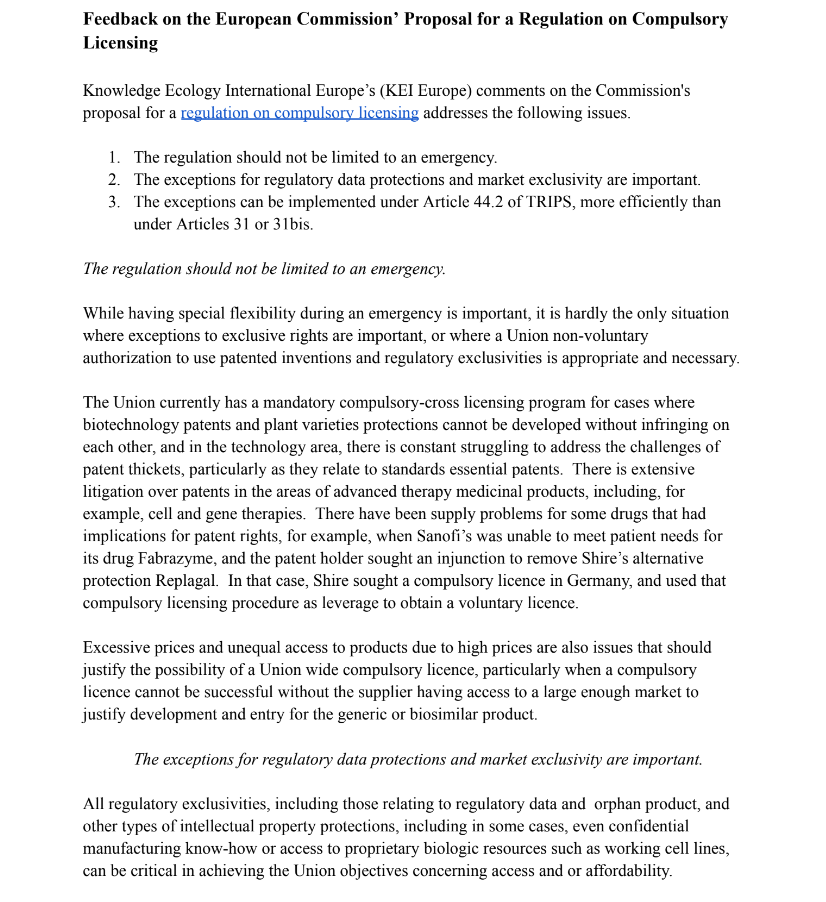31 July 2023
Knowledge Ecology International Europe’s (KEI Europe) comments on the Commission’s proposal for a regulation on compulsory licensing addresses the following issues.
- The regulation should not be limited to an emergency.
- The exceptions for regulatory data protections and market exclusivity are important.
- The exceptions can be implemented under Article 44.2 of TRIPS, more efficiently than under Articles 31 or 31bis.
The regulation should not be limited to an emergency.
While having special flexibility during an emergency is important, it is hardly the only situation where exceptions to exclusive rights are important, or where a Union non-voluntary authorization to use patented inventions and regulatory exclusivities is appropriate and necessary.
The Union currently has a mandatory compulsory-cross licensing program for cases where biotechnology patents and plant varieties protections cannot be developed without infringing on each other, and in the technology area, there is constant struggling to address the challenges of patent thickets, particularly as they relate to standards essential patents. There is extensive litigation over patents in the areas of advanced therapy medicinal products, including, for example, cell and gene therapies. There have been supply problems for some drugs that had implications for patent rights, for example, when Sanofi’s was unable to meet patient needs for its drug Fabrazyme, and the patent holder sought an injunction to remove Shire’s alternative protection Replagal. In that case, Shire sought a compulsory licence in Germany, and used that compulsory licensing procedure as leverage to obtain a voluntary licence.
Excessive prices and unequal access to products due to high prices are also issues that should justify the possibility of a Union wide compulsory licence, particularly when a compulsory licence cannot be successful without the supplier having access to a large enough market to justify development and entry for the generic or biosimilar product.
The exceptions for regulatory data protections and market exclusivity are important.
All regulatory exclusivities, including those relating to regulatory data and orphan product, and other types of intellectual property protections, including in some cases, even confidential manufacturing know-how or access to proprietary biologic resources such as working cell lines, can be critical in achieving the Union objectives concerning access and or affordability.
Regulatory exclusivities are also a problem for the EU-Med4all program, because it makes it impossible to use this program for products that are new and have uses in the EU.
The exceptions can be implemented under Article 44.2 of TRIPS, more efficiently than under Articles 31 or 31bis.
The proposal is modeled to address the TRIPS framework in Article 31 and 31bis. But alternatively the Commission should consider an approach similar to that used by the United States in the COVID 19 crisis, to limit the remedies to infringement subject to reasonable compensation, a solution that is possible under Article 44.2 of TRIPS. There are many advantages of the Article 44.2 approach, including no restrictions on non-predominate uses. The implementation of an Article 44.2 approach in the United States only requires a single sentence in a contract that invokes use of FAR 52.227-1 Authorization and Consent, and as the TRIPS Article is flexible, it is possible to tailor an implementation in ways that the EU finds appropriate.

